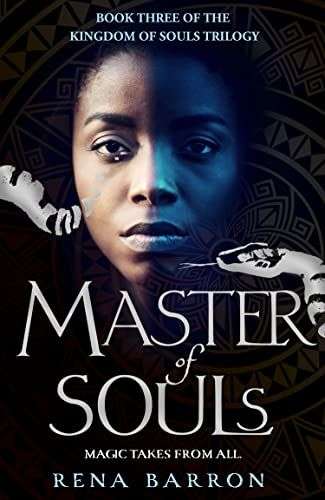We’ve implemented some new protocols around sending us messages via this website. Please email website “at” britishfantasysociety “dot” org for any issues.

For all things fantasy, horror, and speculative fiction
-
Announcement:

Master of Souls
Master of Souls by Rena Barron
MASTER OF SOULS by Rena BarronHarper Voyager h/b £18.99
Reviewed by Nigel Robert Wilson

There is war in heaven, legends being forged, and a testament is to be written. The gods are at war with the demons, and all the nations of the land are suffering.
Dimma, the wife of Daho, has born a child of her own flesh, an abomination in the eyes of the gods, who are demanding she return to the Supreme Cataclysm to become unmade! Her refusal unleashes holy terror upon the cities of Daho’s people.
This part of the trilogy starts with Arrah and her immediate retainers travelling through a blasted landscape seeking the loyal remains of her decimated tribe. She is full of regrets, blaming herself for the poor decisions made and the losses her people have suffered as a consequence. Fate sits very heavily upon Arrah’s shoulders. She is, by nature, a protector and a sustainer. She is also in love with Rudjek, a ghost of the forest.
Efiya was once Arrah’s beloved little sister, but she has become an eater of souls in league with the Demon King. Yet she despises the demon world of ash and broken things. She even holds the Demon King in contempt as she seeks the leadership of all the gods. In this endeavour, she needs the Demon King to facilitate the deaths of Kore, the Divine Creator, and Re’mec, the Almighty One.
To start reviewing the third volume of a trilogy without having read the first two is a difficult project as continuity struggles in the understanding of the tale. The subtitle to this volume is `Magic Takes from All’. A very sound statement as magic is but a vanity deployed by the nonsensical, and the outcome of the plot demonstrates that the power magic unleashes is an illusion, too.
The trilogy is called `The Kingdom of Souls’ and, like most such constructs, is built on a set of theological propositions possessing all the characteristics of an orthodoxy erected out of heterodox compromises. In other words, to the outsider, it seems a muddle, which usually indicates an ancient theology that has evolved over a long period of time through both generations and even dynasties. This theology has dark and destructive characteristics, containing warring divinities, the transmigration of souls, the eating of souls, demonic possession and bitter, unfulfilling conclusions. Its story begins with tragedy, which makes it a challenge indeed.
The original frame of reference appears from words used in the text to lie in Yoruba cultural traditions from West Africa. Whilst great care has been taken to diverge this tale from any original context, it does draw on tradition to describe both characters and events. Parallels with Ancient Egyptian mythology can also be detected within the text. Such a contribution to the fantasy genre that draws from traditions outside the European context has been long overdue.
This is a complex tale with a rich narrative. If anything, it challenges the reader with its manifest difference from normal fantasies of this type. The narrative can feel uncomfortable, and if the reader tries to seek out any subliminal message, they will be lost. Take the book as it comes, and it will tell you that ambition can be destructive and fulfilment is found in repose.
Explore the blog:
Blog categories:
Latest Posts:
Tags:
#featured (56) #science fiction (25) Book Review (264) events (44) Fantasy (231) Graphic Novel (13) horror (136) Members (62) Orbit Books (48) profile (43) Romance (17) Science Fiction (50) short stories (28) Titan Books (52) TV Review (15)
All reviews
Latest Reviews:
- THE HOUSE ON THE BORDERLAND by William Hope Hodgson
- Monstrum by Lottie Mills
- Mood Swings by Dave Jeffery
- Yoke of Stars by R.B. Lemberg
- Hera by Jennifer Saint
- The Black Bird Oracle by Deborah Harkness
- RETURN OF THE DWARVES By Markus Heitz
- Delicious in Dungeon
- Toxxic by Jane Hennigan
- THIS ISLAND EARTH: 8 FEATURES FROM THE DRIVE-IN By Dale Bailey
Review tags:
#featured (2) Action (4) Adventure (4) Book Review (28) Fantasy (18) Featured (2) Feminist (2) Gothic Horror (3) Horror (14) Magic (3) Orbit Books (3) Romance (6) Science Fiction (5) Swords and Sorcery (2) Titan Books (7)